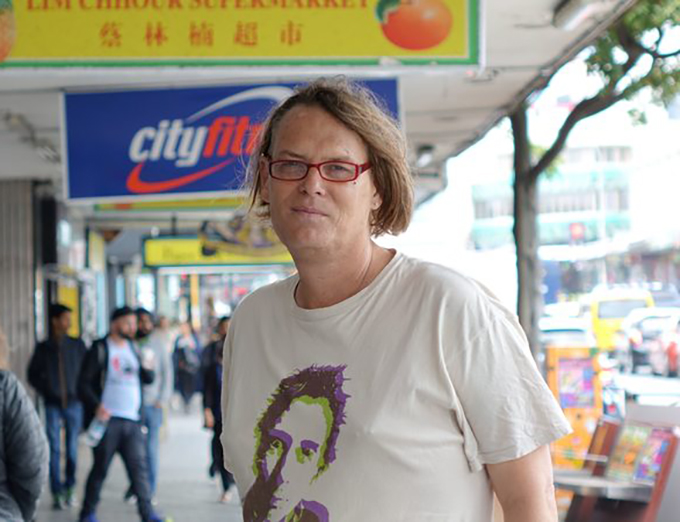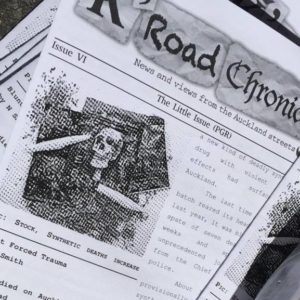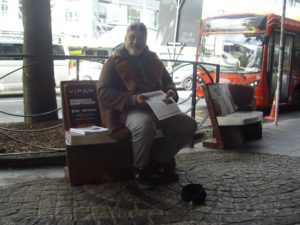
By Michael Andrew
An Auckland journalist and editor is practising true community journalism by sharing the stories of the city’s most marginalised and vulnerable people.
Former Auckland University of Technology journalism student Six is editor of the K’Road Chronicle, a community newspaper capturing the essence and eccentricities of Auckland’s colourful Karangahape Road which serves as home to so many homeless.
A self-described over-qualified, under-employed journalist, Six knows the road as if it were her home. It was for a time; she spent several years living on the streets.
READ MORE: Pacific research of ‘hard’ social issues profiled in new publication
She told Pacific Media Watch this experience gave her a unique perspective to write stories about other rough sleepers for the K’Road Chronicle – some of which have been made into a popular video series through a partnership with Stuff.
“It’s about building trust when I speak with them,” she says.
“I sit alongside them. Their story is my story.”
Supportive AUT staff
While no longer homeless, Six was living on the streets during her time studying at AUT, a difficult period that she says was made easier with the support of the staff on her course.
“There was Greg Treadwell, Helen Sissons. Big respect for David Robie and his wife Del too, if it wasn’t for their support I’m not sure if I would have gotten through,” she says.

“Even the security guards, after I lost my key card and couldn’t afford to pay the $15 or whatever it was for the new one, they knew me and would let me in the building after hours.
“And they even turned a blind eye when I’d occasionally spend the night on one of the couches.”
Head of AUT’s journalism department and Six’s former lecturer, Dr Greg Treadwell, says that her homelessness would have made her studies particularly challenging.
“There were rumours that she was sleeping down on the tenth floor [at the Pacific Media Centre], but I never went down to check.
“So, if that was the level of support through inaction then I’m very happy to have provided that support.”
Social justice journalism
He says that such an experience would have bolstered her journalism with a strong sense of social justice.
“Her heart was always in the homeless community in many ways. And if there’s an advocacy journalism that’s appropriate, then the journalism that advocates for the homeless is fundamentally good journalism.
“If journalism speaks for the voiceless then the homeless have got to be the most voiceless in society.”
After graduating, Six had trouble finding work in the mainstream media, a problem that many journalism graduates are facing.
Her employment troubles led her down other avenues, and while sitting on K’Road one day she realised the wealth of stories that she could find through street locals. After pitching the idea and securing some initial funding from the K Road Business Association, the Chronicle was spawned.
Cult following
Now in its second year, the newspaper has attracted a cult following within the community and beyond.
“I can’t keep up with demand,” Six says. “I’m even getting asked for copies from AUT and the library.”
Other than sharing important stories, the paper is also providing employment for some K’Road locals who get given copies to sell themselves and keep the earnings, something that Dr Treadwell says is another reason why the Chronicle is a valuable asset for the homeless community.

He also says Six’s inability to find work in the mainstream media ultimately proved to be a service to journalism.
“I think it pushed Sister Six in the right direction,” he says.
“I personally think that the orthodoxy of mainstream newsrooms was never going to make her happy, she’s much more of an advocate than that.
“So what she’s doing now is hugely valuable and helpful for society but also probably at this stage really good for her because she’s experienced the lacking of things in life, of comfort and so on.
“She knows what it’s like.”
Gonzo journalism
A fan of American journalist Hunter S. Thompson, Six likens the type of work she does to Thompson’s Gonzo journalism, a style in which the writer becomes so involved with the subject and the subject’s world that he or she actually becomes part of the story.
Treadwell agrees.
“She’s the classic gonzo journalist in a lot of ways.
“She’s much more concerned with outcomes than process, much more interested in shining lights on injustice than necessarily following all the petty rules of the bureaucracy.
“Every city needs a sister six.”
The need for Six’s work is perhaps greater than ever. According to the Auckland Council the number of people classified as “homeless” in Auckland is 20,296. The number of people literally living without shelter day to day is 771.
Pacific Media Centre director Professor David Robie agrees, saying that the K’Road Chronicle came at a critical time.
Paper for the voiceless
“It was an excellent and exciting initiative to start the K’Road Chronicle – not only is homelessness a growing problem in Auckland, but until this publication started the homeless were voiceless as well,” he says.
During her time at AUT, Six filed stories on diversity for the Pacific Media Centre’s Pacific Scoop project.
Dr Robie says the type of diversity reporting that Six is doing is an example for all journalists.
“Journalists should be supporting the voiceless, marginalised and stigmatised far more than they do. The mainstream media are far too close to power and should be far more challenging.
“Six and her community should be congratulated for taking up the challenge – journalism that cares.”
Caring is certainly a value, among others that Six employs in her work.
Journalism values
She says that any journalist can write advertorials or sensationalist articles but it takes a special set of values to write stories about those living on the fringes of society.
Resilience, persistence, resourcefulness, pragmatism and positivity are what enables her to get through life and do the work she does.
“A journalist is nothing without values,” she says.













































